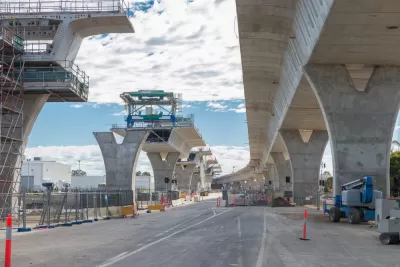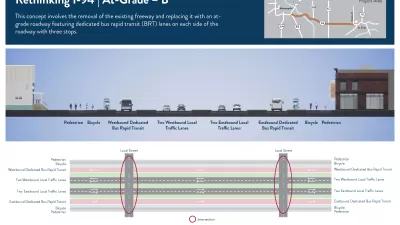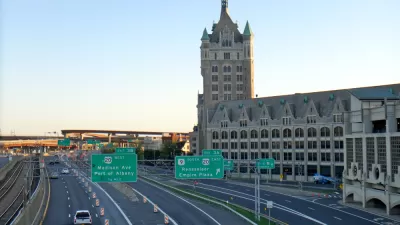The federal Reconnecting Communities program is aimed at supporting highway removal and reversing the damage caused by rampant freeway construction, but some watered down proposals from state agencies could fund road expansion instead.

Competing proposals from lawmakers and state departments of transportation raise questions about how the Biden administration will approach evaluating applications for the Reconnecting Communities Act, which promises $1 billion in federal funding for freeway removal projects.
Writing in Route Fifty, Daniel C. Vock outlines two high-profile examples of cities where activists have been pushing for highway removals, including the infamous Claiborne Expressway in New Orleans. “The story of the Claiborne Expressway is so poignant that the Biden administration referenced it when the president unveiled the idea for Reconnecting Communities,” Vock writes. Yet some transportation officials are backing off removal proposals, expressing concern about the cost of removing freeways, which, in some cases, would surpass the federal funding available. As Vock explains, “The Reconnecting Communities program was cut from $20 billion in Biden’s original proposal to $1 billion in the five-year infrastructure law.”
In some cases, state DOTs want to make aesthetic improvements to existing highways or mitigate the damage of further road expansion with freeway caps and other amenities rather than commit to full highway removal. The Louisiana Department of Transportation has submitted an application for “a $95 million plan that includes the removal of up to four ramps, neighborhood enhancements and expressway improvements,” citing concerns about not only cost, but also the impact of removing the viaduct on local freight and the geo-technical considerations involved in tunneling in the Louisiana soil.
FULL STORY: With $1B at Stake, Clashes Emerge Over Highway Removal

Alabama: Trump Terminates Settlements for Black Communities Harmed By Raw Sewage
Trump deemed the landmark civil rights agreement “illegal DEI and environmental justice policy.”

Study: Maui’s Plan to Convert Vacation Rentals to Long-Term Housing Could Cause Nearly $1 Billion Economic Loss
The plan would reduce visitor accommodation by 25% resulting in 1,900 jobs lost.

Planetizen Federal Action Tracker
A weekly monitor of how Trump’s orders and actions are impacting planners and planning in America.

Wind Energy on the Rise Despite Federal Policy Reversal
The Trump administration is revoking federal support for renewable energy, but demand for new projects continues unabated.

Passengers Flock to Caltrain After Electrification
The new electric trains are running faster and more reliably, leading to strong ridership growth on the Bay Area rail system.

Texas Churches Rally Behind ‘Yes in God’s Back Yard’ Legislation
Religious leaders want the state to reduce zoning regulations to streamline leasing church-owned land to housing developers.
Urban Design for Planners 1: Software Tools
This six-course series explores essential urban design concepts using open source software and equips planners with the tools they need to participate fully in the urban design process.
Planning for Universal Design
Learn the tools for implementing Universal Design in planning regulations.
Caltrans
Smith Gee Studio
Institute for Housing and Urban Development Studies (IHS)
City of Grandview
Harvard GSD Executive Education
Toledo-Lucas County Plan Commissions
Salt Lake City
NYU Wagner Graduate School of Public Service





























